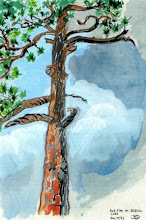Life goes fast. Some twenty years ago, a friend and I who were working in Toronto decided we wanted a change of pace. It was February, we were stressed out, and we badly needed some sun. We asked a travel agent to make us her best offer, and a few days later, found ourselves sitting in a Holiday Inn dining room in Montego Bay. It seemed surreal that only hours earlier we had been plodding though a Canadian winter, and now we were in paradise. It soon became clear, however, that it would take a while for us to acclimatize ourselves to the Jamaican tempo. My friend dropped a fork and beckoned impatiently to a waiter, “Excuse me, could I have a new fork?” The waiter’s bemused answer, accompanied by a calming gesture, became our mantra for the rest of our stay: “Slow down, mon!” As we gradually did manage to slow down, we came to appreciate a very different pace of life; when I would ask when the next bus was scheduled to arrive, the answer would invariably be, “Soon come!” No hurry, no worry. It turned out that a less sped-up approach to life, more focus on relaxation than on efficiency, was exactly what the doctor ordered. My then-girlfriend who came to pick us up in the Toronto airport a week later found two happy and decidedly unwound guys wearing tropical shirts and giggling like schoolgirls, and she wondered if we had perhaps partaken a bit excessively of Jamaica’s famous herbal offerings.
Life has not shifted out of the fast lane since. In the first decade of the 21st century, the almost-unlimited leisure predicted back in the 1960’s somehow never did materialize. If life seemed fast before . . . now it is even faster. We are connected 24/7, and we find ourselves struggling to keep on top of our email, not to mention our Facebook. Our iPhones and BlackBerrys make it possible to react almost immediately to client requests as well as family crises, and the old paradigm of Work/Personal Life Balance seems almost quaint as we negotiate the brave new world of Work/Personal Life Blend.
And the Internet, an amazing and magical tool, increasingly inhabits our thinking and provides us with the means of even greater efficiency, not just in our work but also in in our relationships. In 2000, only 46% of Americans were online; now the figure is 80%. In 2004, people began to speak of the Web 2.0, or “Social Media”: this medium was no longer simply an efficient method of finding information; it became a way of life, a way of making our relationships more efficient. It is astounding how our lives have changed, bit by bit, under the influence of such social media as Facebook, Twitter, LinkedIn and YouTube. Now there are 200 million blogs we can follow . . . 2 billion YouTube viewers, watching 30 billion videos each month. . . as of last July, 20 billion Tweets . . . and 550 million Facebook members, now citizens of the third largest ‘country’ in the world. And everything is just getting faster and faster.
In 2010, Nicolas Carr published The Shallows: What the Internet is Doing to our Brains, an expansion of his thought-provoking 2008 essay “Is Google Making Us Stupid?" . Carr’s premise is that the Internet may actually be changing how we think—that our neural networks are being pruned towards quicker but shallower thinking, like sampling from a smorgasbord rather than sitting down to enjoy a gourmet meal. This new way of thinking may be diminishing our capacity for higher-order cognitive processes: abstract thinking and metaphor, mindfulness, reflection, inductive problem-solving, critical thinking, imagination . . . and my particular concern, our capacity for empathy (part of which is predicated on imaginatively being able to put ourselves in another’s position, and caring about that other feels).
We are beginning to react against the superhuman speed of life, in several domains; in a society of fast food, a new trend becoming popular is that of “slow food": taking a whole day to plan, prepare, and savour a meal with friends who are not in a hurry. Courses on “Mindfulness”, a basic model of Buddhist meditation, are being presented to leaders of industry. And in a world of ever more frenzied multitasking, I recently read on Mashable about a radical new approach to time management: “Single-Tasking", doing just one thing at a time!
But in this sped-up, plugged-in world, just how do we stay human? In fact, how can we become even more human, more humane, in our inner lives and in our dealings with each other? I would like to offer a few suggestions which I believe might help:
- Slow down! Find activities —like eating, walking, running, or talking—that you don’t have to rush through, activities you can savour like fine wine.
- Read a book. Fine, read on your Kindle or your iPad if you must, but read a book from beginning to end, don’t just leapfrog from hyperlink to hyperlink.
- Exercise your imagination. “Imagination is more important than knowledge” was not spoken by a lazy thinker but by Albert Einstein. And imagination still differentiates us from the computer. Make up stories with your kids, pretend, daydream.
- Practice inductive thought. Be mindful, meditate, pay attention as you go through your day. Before going to sleep each night, ask yourself, “What was my favourite moment today?”
- Get into nature. My absolute favourite way of slowing down is wilderness canoeing. It has a way of reconnecting me to what is essential.
- Unplug—from the Internet, from your cellphone, from your laptop, from technology, even from your wristwatch sometime (if you still hang on to that 20th-century artifact!) When my family leaves on a canoe trip into Algonquin Park, we ceremoniously stow our watches in the glove compartment and begin a “timeless” week. It’s a refreshing way to go through a day “time-free”. (And if you miss a movie, there’s always Netflix, lol!)
- Reconnect with loved ones in real, face-to-face time, and cultivate the decidedly slow art of listening.
- Keep a journal: “Reading makes a full man; conference a ready man; and writing an exact man”. (Francis Bacon)
- Play a sport or practice a physical activity like gardening or knitting or yoga or illuminating manuscripts.
I personally love the art of therapy: my office is a place where I can turn off my cellphone, disconnect from technology, tune in to the human story, and connect with another person at a deep and personal level. It’s a rich way to spend my days, and I think it is helping me become more and more human.
Do you have other activities, strategies or tricks that work for you, that help you slow down and help you preserve your humanity? I’d love to hear them. I’d also like any ideas about what kinds of articles might be interesting for me to write. (I’d like to journal more this year—and don’t worry, I’ll make future articles shorter!)









Congratulations Darrell, on your new blog. Outstanding!
ReplyDeleteThanks, Ian! I hope to keep at it.
ReplyDeleteGreat blog Darrell! I'm thoroughly enjoying your style of writing. Looking forward to more great posts.
ReplyDeleteNick
Thanks, Nick. Look forward to reading more of yours as well. Enjoy your big moment. . .
ReplyDeleteThought you may enjoy this:
ReplyDeletehttp://www.donothingfor2minutes.com/
Roger, I do . . . but it’s SO HARD to do nothing for two whole minutes!
ReplyDeleteIn McLuhan's terms, are social media "warm" or "cool"? Do they bring us closer ... Or distance us from each other?
ReplyDeleteVery interesting reflections! When can we expect your next blogpost? ;-)
Shorter articles are not the issue here. People that take time to read your Blogs are the people that have slowed enough to enjoy God's work in nature and their fellow man.
ReplyDelete